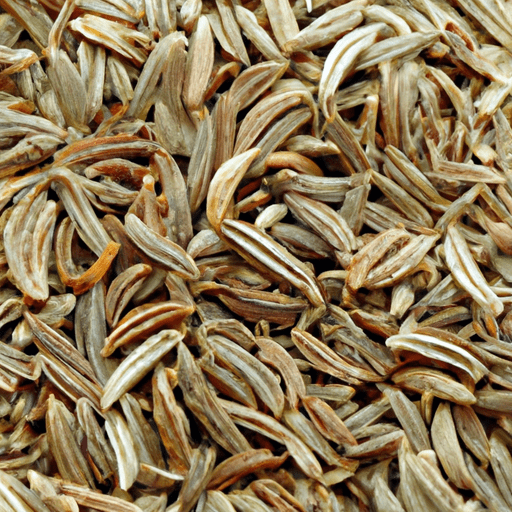Cumin Seed: A Rich and Flavorful Spice for Culinary Adventures
If you’ve ever explored the vast world of spices, chances are you’ve come across the aromatic and versatile cumin seed. Known for its distinct flavor and aroma, cumin seed is a staple in many cuisines around the globe. In this blog post, we’ll delve into the captivating world of cumin seed, taking a closer look at its taste profile, common culinary uses, nutritional value, and uncovering some fascinating history and facts along the way.
A Taste Journey with Cumin Seed
Cumin seed boasts a warm and earthy taste profile that adds depth and complexity to a wide variety of dishes. When toasted or dry-roasted, its flavor intensifies, releasing a subtle smokiness that enhances the overall culinary experience. The aroma of cumin seed can be described as a delightful combination of earthiness, nuttiness, and a hint of citrus.
Incredible Culinary Applications
From South Asia to the Middle East, cumin seed has found its way into countless traditional recipes, making it an essential spice in many culinary traditions. Let’s explore some common uses of cumin seed that are sure to bring a burst of flavor to your cooking adventures:
Indian Cuisine: Cumin seed is a key ingredient in Indian dishes such as curries, vegetable stir-fries, and rice pilafs. Its warm and slightly peppery flavor elevates the taste of both vegetarian and meat-based preparations.
Mexican Delights: Cumin seed plays a pivotal role in Mexican cuisine, particularly in chili con carne, salsas, and tacos. Its addition lends an authentic and distinctive Mexican flair to these beloved dishes.
Middle Eastern Marvels: In Middle Eastern cooking, cumin seed is frequently used in spice blends like za’atar, a combination of dried herbs and spices. It also finds its way into falafel, hummus, and lamb dishes, imparting a savory note that complements the region’s bold flavors.
Unveiling the Nutritional Powerhouse
Beyond its tremendous flavor, cumin seed packs a punch when it comes to nutritional value. Rich in antioxidants and essential minerals, it offers a range of health benefits. Cumin seed is an excellent source of iron, which is crucial for maintaining healthy blood cell production. It also contains vitamin C, vitamin E, and several B-complex vitamins, all of which play vital roles in supporting overall well-being.
Fascinating History and Fun Facts
Cumin seed holds a long and storied history. Believed to be native to the Mediterranean and the Middle East, it has been cultivated and used in cooking for thousands of years. Ancient Egyptians considered it a symbol of love, while the ancient Greeks and Romans employed cumin seed as a digestive aid.
Interestingly, cumin seed was so highly prized in the Middle Ages that it was used as currency in trade. It even made its way into the hands of explorers, who carried it on their voyages to add flavor to their meals and preserve food during long expeditions.
Incorporate Cumin Seed into Your Culinary Repertoire
Ready to embark on a flavor-filled journey with cumin seed? Here are some tips to make the most of this remarkable spice:
- Toast whole cumin seeds in a dry pan before grinding to enhance their flavor.
- Create a fragrant spice blend by combining cumin seed with coriander, paprika, and turmeric.
- Sprinkle ground cumin seed generously over grilled meats or roasted vegetables for a burst of taste.
- Incorporate cumin seed into your homemade bread or savory muffin recipes for an intriguing twist.
Now armed with a deeper understanding of cumin seed, its taste profile, culinary uses, nutritional benefits, and intriguing history, you’re ready to experiment with this captivating spice in your own kitchen. Let your taste buds guide you as you explore the versatility and richness that cumin seed has to offer. Happy cooking!
Origin:
- Cumin seeds (Cuminum cyminum) are native to the eastern Mediterranean, but they are now cultivated and widely used in various cuisines around the world.
- The use of cumin dates back to ancient Egypt, where it was commonly used for both culinary and medicinal purposes.
- Cumin seeds were also extensively used in Ancient Rome and Greece.
Common Uses:
- Cumin seeds are a popular spice in many cuisines, including Indian, Middle Eastern, Mexican, and North African.
- They have a warm, earthy flavor with a slightly bitter undertone, which adds depth and complexity to dishes.
- Cumin seeds are commonly found in spice blends like curry powder, garam masala, and chili powder.
- They can be used whole or ground, depending on the recipe, and are often added to soups, stews, curries, rice dishes, and meat rubs.
Nutritional Benefits:
- Cumin seeds are a good source of iron, containing approximately 20% of the recommended daily intake per tablespoon.
- They also provide small amounts of other essential minerals like manganese and calcium.
- Cumin seeds are high in antioxidants, which help combat oxidative stress and inflammation in the body.
- They contain certain compounds that may aid in digestion and provide relief from digestive issues like bloating and indigestion.
Unique Properties and Historical Significance:
- Besides its culinary use, cumin seeds have a long history of medicinal use. They were traditionally used to treat digestive disorders, improve immunity, and stimulate milk production in nursing mothers.
- Some studies suggest that cumin seeds may have antimicrobial properties, with potential benefits against certain bacteria and fungi.
- In traditional Ayurvedic medicine, cumin seeds are considered to have a heating and cleansing effect on the body and are believed to support digestion and overall well-being.




Use the share button below if you liked it.
It makes me smile, when I see it.